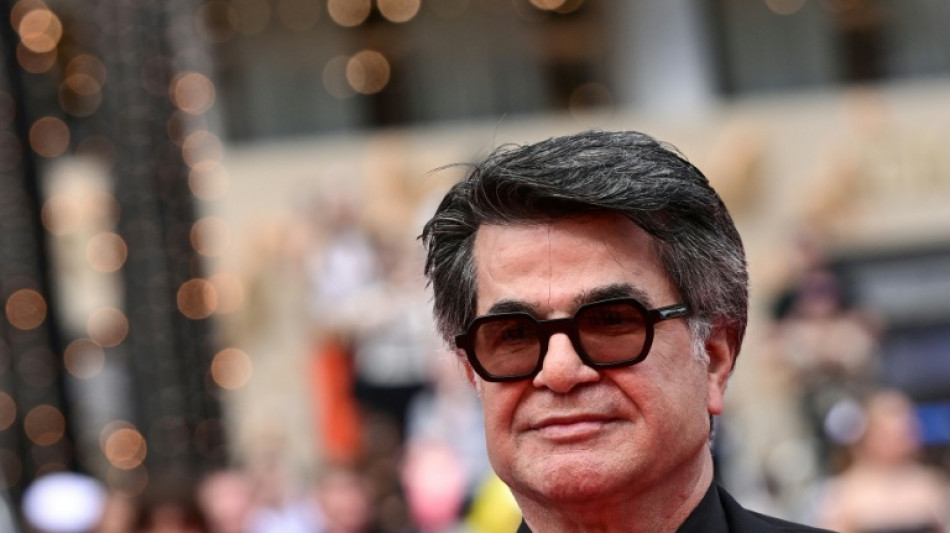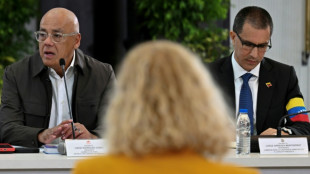
-
 UK royal finances in spotlight after Andrew's downfall
UK royal finances in spotlight after Andrew's downfall
-
Diplomatic shift and elections see Armenia battle Russian disinformation

-
 Undercover probe finds Australian pubs short-pouring beer
Undercover probe finds Australian pubs short-pouring beer
-
Epstein fallout triggers resignations, probes

-
 The banking fraud scandal rattling Brazil's elite
The banking fraud scandal rattling Brazil's elite
-
Party or politics? All eyes on Bad Bunny at Super Bowl

-
 Man City confront Anfield hoodoo as Arsenal eye Premier League crown
Man City confront Anfield hoodoo as Arsenal eye Premier League crown
-
Patriots seek Super Bowl history in Seahawks showdown

-
 Gotterup leads Phoenix Open as Scheffler struggles
Gotterup leads Phoenix Open as Scheffler struggles
-
In show of support, Canada, France open consulates in Greenland

-
 'Save the Post': Hundreds protest cuts at famed US newspaper
'Save the Post': Hundreds protest cuts at famed US newspaper
-
New Zealand deputy PM defends claims colonisation good for Maori

-
 Amazon shares plunge as AI costs climb
Amazon shares plunge as AI costs climb
-
Galthie lauds France's remarkable attacking display against Ireland

-
 Argentina govt launches account to debunk 'lies' about Milei
Argentina govt launches account to debunk 'lies' about Milei
-
Australia drug kingpin walks free after police informant scandal

-
 Dupont wants more after France sparkle and then wobble against Ireland
Dupont wants more after France sparkle and then wobble against Ireland
-
Cuba says willing to talk to US, 'without pressure'

-
 NFL names 49ers to face Rams in Aussie regular-season debut
NFL names 49ers to face Rams in Aussie regular-season debut
-
Bielle-Biarrey sparkles as rampant France beat Ireland in Six Nations

-
 Flame arrives in Milan for Winter Olympics ceremony
Flame arrives in Milan for Winter Olympics ceremony
-
Olympic big air champion Su survives scare

-
 89 kidnapped Nigerian Christians released
89 kidnapped Nigerian Christians released
-
Cuba willing to talk to US, 'without pressure'

-
 Famine spreading in Sudan's Darfur, UN-backed experts warn
Famine spreading in Sudan's Darfur, UN-backed experts warn
-
2026 Winter Olympics flame arrives in Milan

-
 Congo-Brazzaville's veteran president declares re-election run
Congo-Brazzaville's veteran president declares re-election run
-
Olympic snowboard star Chloe Kim proud to represent 'diverse' USA

-
 Iran filmmaker Panahi fears Iranians' interests will be 'sacrificed' in US talks
Iran filmmaker Panahi fears Iranians' interests will be 'sacrificed' in US talks
-
Leicester at risk of relegation after six-point deduction

-
 Deadly storm sparks floods in Spain, raises calls to postpone Portugal vote
Deadly storm sparks floods in Spain, raises calls to postpone Portugal vote
-
Trump urges new nuclear treaty after Russia agreement ends

-
 'Burned in their houses': Nigerians recount horror of massacre
'Burned in their houses': Nigerians recount horror of massacre
-
Carney scraps Canada EV sales mandate, affirms auto sector's future is electric

-
 Emotional reunions, dashed hopes as Ukraine soldiers released
Emotional reunions, dashed hopes as Ukraine soldiers released
-
Bad Bunny promises to bring Puerto Rican culture to Super Bowl

-
 Venezuela amnesty bill excludes gross rights abuses under Chavez, Maduro
Venezuela amnesty bill excludes gross rights abuses under Chavez, Maduro
-
Lower pollution during Covid boosted methane: study

-
 Doping chiefs vow to look into Olympic ski jumping 'penis injection' claims
Doping chiefs vow to look into Olympic ski jumping 'penis injection' claims
-
England's Feyi-Waboso in injury scare ahead of Six Nations opener

-
 EU defends Spain after Telegram founder criticism
EU defends Spain after Telegram founder criticism
-
Novo Nordisk vows legal action to protect Wegovy pill

-
 Swiss rivalry is fun -- until Games start, says Odermatt
Swiss rivalry is fun -- until Games start, says Odermatt
-
Canadian snowboarder McMorris eyes slopestyle after crash at Olympics

-
 Deadly storm sparks floods in Spain, disrupts Portugal vote
Deadly storm sparks floods in Spain, disrupts Portugal vote
-
Ukrainian flag bearer proud to show his country is still standing

-
 Carney scraps Canada EV sales mandate
Carney scraps Canada EV sales mandate
-
Morocco says evacuated 140,000 people due to severe weather

-
 Spurs boss Frank says Romero outburst 'dealt with internally'
Spurs boss Frank says Romero outburst 'dealt with internally'
-
Giannis suitors make deals as NBA trade deadline nears


Back at Cannes, Iran filmmaker Panahi defies repression
Back in Cannes for the first time in 15 years, dissident Iranian filmmaker Jafar Panahi spoke to AFP about how he feels "alive" thanks to filmmaking and the danger of continuing to work in the Islamic republic.
Imprisoned twice and until recently subjected to a travel ban, Panahi also said he was not afraid of the consequences of showing "It Was Just an Accident" in Cannes.
The answers have been translated by AFP from the original Persian and edited for clarity:
Q: Your new film "It Was Just an Accident" explores the moral dilemma faced by Iranians tempted to take revenge on their torturers. What does this say about the issues facing Iranian society?
"We chose a range of characters, from violent to non-violent, from a simple man to someone completely detached from such concerns.
"Through their actions and reactions, we reach -- or perhaps fail to reach -- a conclusion about what the right path might be.
"We let the viewer decide for themselves, asking what would they do in that situation? For me, the real question is: what would I do if this actually happened? And honestly, I don't know.
"And in the end, perhaps the film suggests that the real issue lies within a flawed structure — and that the problem lies with the government, not the people trapped inside it."
Q: In what way does your film denounce a system of government?
"It's about how we can shape the future of this country. Where is it headed? Will this cycle continue, or will we reach a place where no one dictates how we dress, what we create, or what we eat? No one has the right to control that.
"We are looking forward, thinking a few steps ahead. When will this become a reality? I don't know. But I hope it will, and I believe that it will."
Q: You were sentenced in 2010 and imprisoned twice in Iran. Are you afraid for your safety when you return home after Cannes?
"What matters most is that the film gets made... I haven't made space in my thoughts for whatever else might happen. I'm alive as long as I'm making films. If I'm not making films, then what happens to me no longer matters."
Q: How do you feel about being back at the Cannes Festival?
"The truth is I missed watching films with an audience because I couldn't put my films on in cinemas, I couldn't sit and watch them or see people's reactions. That's the biggest thing, to experience a film with an audience. When you watch a film with others, you feel alive.
"Cannes is a bigger stage and has its own qualities, but what I truly want is to sit in a cinema with ordinary people in Iran and watch this film. That's the most important thing."
Q: Do you fear being prevented from making films due to restrictions in Iran?
"They (the Iranian government) have always stopped us from making films, but we find a way. It's typical of regimes like this: they don't let artists work, they don't let anyone do what they love.
"What matters is that you find a way, just as I and other friends have done. The important thing is not to give up trying, and not to expect a regime like this to suddenly say: 'Go ahead, make your film.'
"When they gave me a 15- or 20-year work ban, I could have easily gone home and told myself: 'That's it, it's over. I can't do anything, it's not my fault,' and then let myself sink into despair.
"But I thought: 'No -- what should I do instead?' The important thing is to keep working."
Q.Najjar--SF-PST

